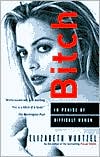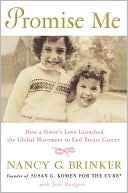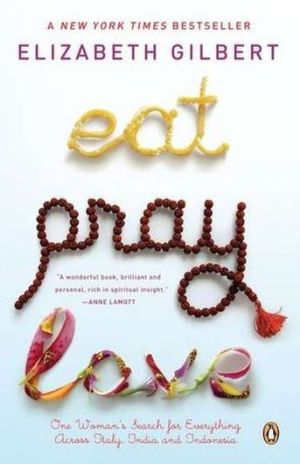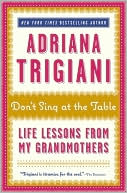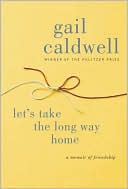Bitch: In Praise of Difficult Women
No one better understands the desire to be bad than Elizabeth Wurtzel.\ Bitch is a brilliant tract on the history of manipulative female behavior. By looking at women who derive their power from their sexuality, Wurtzel offers a trenchant cultural critique of contemporary gender relations. Beginning with Delilah, the first woman to supposedly bring a great man down (latter-day Delilahs include Yoko Ono, Pam Smart, Bess Myerson), Wurtzel finds many biblical counterparts to the men and women in...
Search in google:
A look at the history of manipulative female behavior, from Delilah to Amy Fisher. BUST Magazine You've probably already heard all about this book, in which Elizabeth Wurtzel takes up the cause of the bitch, tracing her history from biblical times to modern day. But what you may not have heard is that the book is good....Even if you don't agree with Wurtzel's conclusions, I guarantee that you will never view news stories about women the same way again.
As feminism has charged forward—and no one can deny the leaps and strides it has made—so has the invention of the overeager hypersexualized female body. Nowadays you pay for sex not because you are lonely and miserable and can't get laid, or married and looking for cheap thrills, but because sex as a commodity is not distasteful; it's interesting. The recent best-seller by three Hollywood call girls, You'll Never Make Love in This Town Again, essentially chronicles the availability for money of just about anything. The women write about their experiences servicing major Hollywood movie stars, men who presumably don't "have to" pay for sex, but like to be able to control the action, or like the absence of any emotional involvement, or just plain think it's cool. In the midst of all this, it seems hard to talk about date rape or anything else, because as much as women may try to be seen not as sex objects there is a countervailing force, in which many women collaborate—mostly out of financial need—to turn women into nothing but sex objects.\ Which is why the good-time liberated lady whose sexual bravado could be celebrated by Germaine Greer and Helen Gurley Brown alike has metastasized over time into a harsh, hard force of flat, canned sexuality whose most protuberant and pertinent metonymy is the obvious and bulbous silicone breast implants that caricature a sexual reality that is already a cartoon, that don't even try to mimic mammarian nature.\ I think the choices become whether you will use it for yourself or against. Look, I think many people have rescued themselves from this game, but pretty girls, girls who learned to manipulate, girls whose hearts always belonged to daddy—they just can't help it. And the world rewards it at the same time it condemns it. On the whole, one lesson of a book like You'll Never Make Love in This Town Again is that sex is really not much of a weapon in the end. You need to have some talent and brains or nothing will work. Most men who sleep with some girl won't want to give her a job since they'd prefer never to deal with the situation again. I think that's the main thing that's missing from any discussions of this subject—the complexities of date rape, the way strip clubs have become feminist enterprise zones while ignoring the degrading damaging nature of the work. For a woman to do just as she pleases and dispense with other people's needs, wants, demands and desires continues to be revolutionary. Men pretty much do as they will, and women pretty much continue to pick up the slack. That's why books like The Rules and Men Are from Mars, Women Are from Venus succeed. It remains to this day, even after feminism, a woman's chore to close the gap. Time is not on our side, our youth and beauty is brief, tick-tock the biological clock, and that message is thrown at us over and over again. In Manhattan Nocturne, an unusually perspicacious noir novel with the genre's usual theme of the good man brought down by a beautiful bad girl, the author Colin Harrison muses at one point on what a short shelf life a pretty girl in New York City has. "I would say the most determined people are the young women who arrive in the city from America and around the world to sell, in one way or another, their bodies: the models and strippers and actresses and dancers who know that time is running against them, that they are temporarily credentialed by youth."\ Of course, we are meant to understand that this is the lot of glamour girls, that those of us who put brains beforebeauty need not worry about this stuff. But to paraphrase Rosie O'Donnell once again: It feels as if it's true for us all. And while there are commitment-phobic women, the story you always hear when there is a troubled relationship—when the balance of power is off—for the most part it's always the one of women trying to get men to tie the knot. Now, I personally know a number of women who are putting off their boyfriends who are eager to get married—but those relationships are not the ones that seem in constant crisis, they are not the ones where somebody is always complaining, because for any number of reasons, the focus on commitment still only assumes a desperate cast when the woman is the injured party.\ And the fact that all this relationship anxiety marks a regression of sorts is not lost on pioneers of the women's movement who thought it would be better by now. London eating disorders expert Susie Orbach, author of Fat Is a Feminist Issue, is the founder of the Women's Therapy Centre, where among her patients was Princess Diana. "I see all sorts of young confident women around," she told Mirabella in late 1996. "But when they're in my consulting room, they talk about the same bloody issues we had thirty years ago. They're afraid. Women in the most oppressive relationships are trying to manage them rather than get out of them. Only now, with no women's movement, if you have problems you feel like a freak. All the problems are internalized."\ That's why The Rules is a runaway best-seller and may well be a perennial hit.\ But it is wrong to see that book as a setback to feminism in any way, or to be mad at the authoresses for their Aunt Edna-like advice because the book is completely nonideological: feminism is beside the point in a list of what is probably fairly sound advice for learning to behave like a woman who is about to embark on some serious, goal-oriented dating. It tells women how to act so as to compensate for the fact that while feminism has changed the way many of us think and behave, while it has made men change diapers and do dishes and spend quality time with children while women perform neurosurgery and direct movies and trade Eurodollars, it has failed to truly change the way we feel. The proof: Go to any bookstore and there are hundreds of titles in the self-help section about how to overcome love addiction and fear of abandonment and the like, and while there are plenty of books for women about how to deal with commitment-resistant, impossible men—Smart Women, Foolish Choices and the like—there is not one book addressed to men about how to work out their own damn problems with relationships. No book for men about how to get over fear of commitment, how to learn to open one's heart, how to stop running from emotional involvement—I know, because I searched high and low for such a thing for my last boyfriend and it doesn't exist.\ Do you know why?\ Because it doesn't need to. Men don't have to change the way they sexually assess women, the way certain triggers and indications of female power or feminine weakness may frighten them off. They don't have to change the psychic messages inculcated into their brains from way back in their preverbal, pre-Oedipal days. They don't have to because we women will learn to behave.\ Well, I for one am sick of it. All my life, one person or another has been telling me to behave, saying don't let a guy know you're a depressed maniac on the first date, don't just be yourself, don't show your feelings. And the truth is, this is probably good advice, men probably don't like overbearing, hotheaded women who give blow jobs on the first date. In all likelihood the only man who will ever like me just as I am will probably need to believe I'm somebody else at first. I probably do need to learn to behave. But I don't like it. It seems like, all this, all these years of feminism, Mary Wollstonecraft, Charlotte Perkins Gilman, Simone de Beauvoir, Virginia Woolf, Gloria Steinem, Susan Faludi—all that smart writing all so we could learn to behave? Bra burning in Atlantic City—so we could learn to behave? Roe v. Wade—so we could learn to behave? Thelma & Louise—so we could learn to behave? The gender gap—so we could learn to behave? Madonna, Sally Ride, Joycelyn Elders, Golda Meir, Anita Hill, Bette Davis, Leni Riefenstahl—all those strong, indefatigable souls so we could learn to behave? What good really have any of those things done if we still get the feeling that we have to contain our urges and control ourselves in the interest of courtship and love? Did Germaine Greer importune us so long ago with the words "Lady, love your cunt," and did Anka Radikovich regale us with her tales of the sexual picaresque in The Wild Girls Club so we could be told never to succumb to sexual abandon on the first date? After all this agitation, along comes The Rules to tell us that we're not even allowed to accept a date for a Saturday night after Wednesday.\ Here's my point: I have no quarrel with The Rules or the advice it gives—it actually seems pretty sound to me—but if we had really come a long way, baby, if men's perceptions of women had transformed fundamentally and intensely so that we were accepted as full-fledged sexual creatures and romantic operatives who were free to chase or be chased, and if this expanded dimension of women's sexual personae were not frightening or overwhelming to them, then we would not need The Rules. We would be truly free.\ So of course the bitch persona appeals to us. It is the illusion of liberation, of libertine abandon. What if you want to be large in a world that would have you be small, diminished? You don't want to diet, you don't want to say no, thank you, and pretend somehow that what is there is enough when always, always, you want more. That has been your defining characteristic: You have appetites, and only if you are truly shameless will you even begin to be sated because nothing is ever really enough. Not because you are greedy or insatiable but because you can't help it, you can't go along with the fiction that the world would have you believe and adhere to: that you ought to settle and be careful and accept the crumbs that are supposed to pass for a life, this minimized self you are supposed to put up with, that feminism and other political theories of woman cannot really begin to address because this is about something else entirely.\ This is about what has become the almost monstrous notion of female desire. This is not about making demands of other people or wearing down those who have their own screams for MORE! to address: You'd be amazed at how often we are reluctant to indulge ourselves by our own means. It is amazing that the smallness of the space we've been told to squeeze into has meant that we don't even know how to ask or what to want. Everything tells us to stop, to not talk to that guy first, to not have a thousand lovers if that's what feels right because one husband is supposed to be enough. Everything says we don't need another piece of chocolate cake, we don't need another Gucci bag, another dime-store lipstick, another Big Mac, another night on the town, another spin on the Rainbow Room dance floor. Well, this is meant to be a story about people who are so beyond need, who want and have figured out that it's never too soon to make demands of this life, this world, this everything. It's about how nice it must be to just decide I will not be nice, I am never sorry, I have no regrets: what is before me belongs to me.\ But for a woman, to assume she has to be not nice, it puts her outside of the system, outside of what is acceptable. She can be a deeply depressive Sylvia Plath, a luxuriating decadent Delilah, a homicidal adolescent Amy Fisher, she can be anyone who decides that what she wants and needs and believes and must do is more important than being nice. She may, in fact, be as nice as can be, but as soon as she says catch me if you can I'm so free this is my life and the rest can fuck off and die—as soon as she lays down the option of my way or the highway, it's amazing how quickly everyone finds her difficult, crazy, a nightmare: a bitch.
INTRODUCTION Manufacturing Fascination1PART ONE He Puts Her on a Pedestal and She Goes Down on It35PART TWO Hey Little Girl Is Your Daddy Home?93PART THREE There She Goes Again159PART FOUR The Blonde in the Bleachers225PART FIVE Used to Love Her but I Had to Kill Her295EPILOGUE Did I Shave My Legs for This?383BIBLIOGRAPHY 415ACKNOWLEDGMENTS 428PERMISSIONS433
\ From Barnes & NobleThe Barnes & Noble Review\ Bitch, Elizabeth Wurtzel's second book, was written over the course of a year in which she lived in four different apartments, three hotels, one seamy residential motel, and two houses. But the book is anything but transient. In luminescent prose, Wurtzel takes to task a double standard imposed on women: the cultural insistence on goodness and society's complete obsession with badness. \ No one understands the desire to be bad more than Elizabeth Wurtzel. Bitch is a brilliant tract on the history of manipulative female behavior. By looking at women who derive their power from their sexuality, Wurtzel offers a trenchant cultural critique of contemporary gender relations. Beginning with Delilah, the first woman to supposedly bring a great man down (latter-day Delilahs include Yoko Ono, Pam Smart, and Bess Myerson), Wurtzel finds many biblical counterparts to the men and women in today's headlines. In five brilliant essays, she links the lives of women as demanding and disparate as Amy Fisher, Hillary Clinton, Margaux Hemingway, and Nicole Brown Simpson. Wurtzel gives voice to those women whose lives have been misunderstood, who have been dismissed for their beauty, their madness, their youth. She finds in the story of Amy Fisher the tragic plight of all Lolitas, our thirst for their brief and intense flame. She connects Hemingway's tragic suicide to those of Sylvia Plath, Edie Sedgwick, and Marilyn Monroe, women whose beauty was ultimately an end in itself. Writing about the wife/mistress dichotomy, Wurtzel explains how some women are anointed wife material whileothersare relegated to the role of mistress.\ Both celebratory and cautionary, Bitch catalogues some of the most infamous women in history, defending their outsize desires, describing their exquisite loneliness, and championing their take-no-prisoners approach to life and to love. Whether writing about Courtney Love, Sally Hemings, Bathsheba, Kimba Wood, Sharon Stone, or Princess Di — or waxing eloquent on the hideous success of The Rules, the evil that is The Bridges of Madison County, the twisted logic of You'll Never Make Love in This Town Again — Wurtzel is back with a bitchography that cuts to the core.\ \ \ \ \ \ BUST MagazineYou've probably already heard all about this book, in which Elizabeth Wurtzel takes up the cause of the bitch, tracing her history from biblical times to modern day. But what you may not have heard is that the book is good....Even if you don't agree with Wurtzel's conclusions, I guarantee that you will never view news stories about women the same way again.\ \ \ Library JournalThere is little praise for women in Wurtzel's hyperbolic rant about "bad girls" and their relationship to Western society. Indeed, hip turns of phrase frequently replace logic in this often smug and overwritten screed. In her defense, Wurtzel (Prozac Nation, LJ 8/94) has taken on a huge project, and every now and again she introduces a startling insight about how women manipulate situations to control their lives. Her look at the biblical tale of Samson and Delilah is particularly instructive in elucidating the history of our reaction to the alluringly repulsive femme fatale. Likewise, her presentation of both mythic and real women who flaunt their "pussy power" makes for provocative reading. Nonetheless, nearly a quarter of the book focuses on Nicole Brown Simpson (who few would call a "difficult woman") and is shockingly mean-spirited. While she lambastes the Simpson jury as "just plain stupid," we never learn how she knows what the jury did not: that O.J. killed Nicole. Since she was not in the courtroom, her cavalier dismissal of the verdict rankles and casts doubt on her other arguments. Worse, she seems to believe that violence is endemic to being "crazy in love," and her writing romanticizes the black eye and slapped cheek as proof of passionate involvement. In addition, Wurtzel completely ignores lesbiansan odd omission since the expression of Sapphic love represents a blatant rejection of "good girl" normsand dismisses the happily single, writing that "it would be easier to eliminate racism or end poverty or cure illiteracy or dethrone Fidel Castro than it would to make girls stop wanting to be brides." Recommended only as catalyst for debate. [Previewed in Prepub Alert, LJ 9/1/97.]Eleanor J. Bader, New School for Social Research, New York\ \ \ \ \ Lily BuranaI was so hungry for this book. Bitch has been hyped as a text that would examine the way women are punished for misbehavior that would seem merely piquant in men, how female sexuality and credibility are seen as mutually exclusive and how women have -- and haven't -- "gotten away with it." Ah, would that it were so.\ Wurtzel is the Marisa Tomei of literature: a cute, bright girl who has invoked wrath not because she has the audacity to be unashamedly cute and bright, but because she plays up the cuteness (winsome waif on the cover of her first book, Prozac Nation; glammed out, topless and middle finger aloft on the cover of Bitch) while creating mediocre works that those less attractive, less connected or simply less lucky probably couldn't dream of seeing so richly rewarded. She's seen as someone who skates by, an ugly reminder that life isn't fair and success isn't based on merit. People play on her self-absorption and problematic personality, too, but talent tends to obviate those things. Anne Sexton and Sylvia Plath were forgiven their trespasses (as are Philip Roth and the rest of the boys) because they wrote like motherfuckers. The dismissal of Miss Liz isn't unchangeable; all Wurtzel would have to do to shut everybody up is write a really great book. Unfortunately, she hasn't.\ Bitch should have been subtitled "In Praise of the Semicolon." Instead of the brilliant treatise that would silence Wurtzel's detractors, it's a fury of lists, signifying little. Wurtzel confessed in Newsweek that she had a drug problem during the time that she was writing the book, and the speed clearly drives the text. It jitterbugs from one woman stranded on society's sexual barbed wire -- Courtney! Delilah! Lolita! Margaux! Hillary! -- to another, all rat-a-tat cultural citations interjected with moments of great craft and observation, then squeals off on some really looooong tangent that ends with a recitation of a commercial jingle or song lyric that confuses the point.\ Hey, Liz, where you going with that gun in your hand? The women that Wurtzel ruminates about include, among others, Nicole Brown Simpson and Amy Fisher. Why? Is Amy Fisher anyone's idea of a "bitch"? She's a confused kid from Long Island with a felonious approach to resolving her inner conflicts. Wouldn't Aileen Wuornos make a more interesting "bitch"? She at least chose her targets correctly. She felt helpless at the hands of men, so she attacked men. Fisher felt helpless at the hands of one man, so she shot his wife. And what about Tonya Harding? Unfortunately, Wurtzel focuses almost entirely on bitches vis-a-vis men. Bitch-against-bitch isn't in her sights.\ The reader gets so ground down by this book's poorly presented arguments and solipsism, one's own inner bitch is tempted to wield the lash, especially when Wurtzel's sharp prose ends up nullified by cattiness. When, in trying to point out that Hillary Clinton gets short shrift, she writes, "The First Lady earns less than her secretary...The First Lady earns less than you do. And she has thick calves," one wants to scream at the cover picture, "Damn, honey, no one's gonna confuse you with a beauty queen, either." Bitch begets bitchiness.\ While supposedly celebrating women who call their own shots, to whatever effect, Wurtzel moans that the fate of a woman is to be at the mercy of the big bad man's world and her own biological clock. It doesn't quite work that way. Men may have the lion's share of the money and control, yet nonetheless they're extremely vulnerable to their desires. If it weren't so, the "femme fatale" would be archetype non grata.\ Count on this book to raise some interesting issues, but don't expect any fresh or deep conclusions about them. I'm confident that Wurtzel has a great book in her, but she needs a forceful editor and all her wits about her to pull it off. Bitch is little more than occasional short puffs of fresh air in a long exercise in frustration for the reader (and, apparently, the writer). But I will grant her this: She has very pretty tits.\ —Salon\ \ \ \ \ \ Karen Lehrman...one of the more honest, insightful and witty books on the subject of women to have come along in a while. \ — New York Times Book Review\ \ \ \ \ Kirkus ReviewsThe epithet "bitch" has no male equivalent, and Wurtzel explains this inequity in a series of overgrown essays that swings from insightful to banal. At its best, Wurtzel's discursive style is akin to soapbox oratory. Studying women throughout history, from Delilah to Zelda Fitzgerald, who have gained influence by using their sexuality to manipulate men and events, Wurtzel points out that this path has often been "the only option" for women seeking "to be both powerful and sexy." But a woman who uses sex appeal to gain power is also likely to be dismissed, vilified, or, at the very least, labeled dangerous or difficult. But while there's some thoughtful analysis, a lot of entertaining information, and a good deal of clever writing, the book digresses too often from its central notion to persuade any but the already converted that the world can't handle difficult women. Indeed, it appears that what has proven most difficult for bitches has been handling their own power. Wurtzel identifies with their difficult choices and suffering and helps us empathize, yet her attitude toward the women she chooses to study often seems ambivalent. Expositions on desire, anger, sex, and madness figure throughout this serpentine analysis. Mostly her message gets bogged down in a tangle of bitching. As in her previous work, Prozac Nation (1994), Wurtzel generalizes from her own experience. To rephrase a Muriel Rukeyser poem she cites, the world would not split open if one woman told the truth about her life. "It would more likely derogate such `truth' by reducing it to no more than a silly girl's excessive emotionalism," Wurtzel writes, taking a preemptive strike at her detractors. At its worst, thebook becomes an extended defense of Wurtzel's own recalcitrant "bad" behavior. Wurtzel's talent for provocative prose and sexy subjects perfectly lends itself to a screed on female power that is refreshing and irritating by turns. \ \
